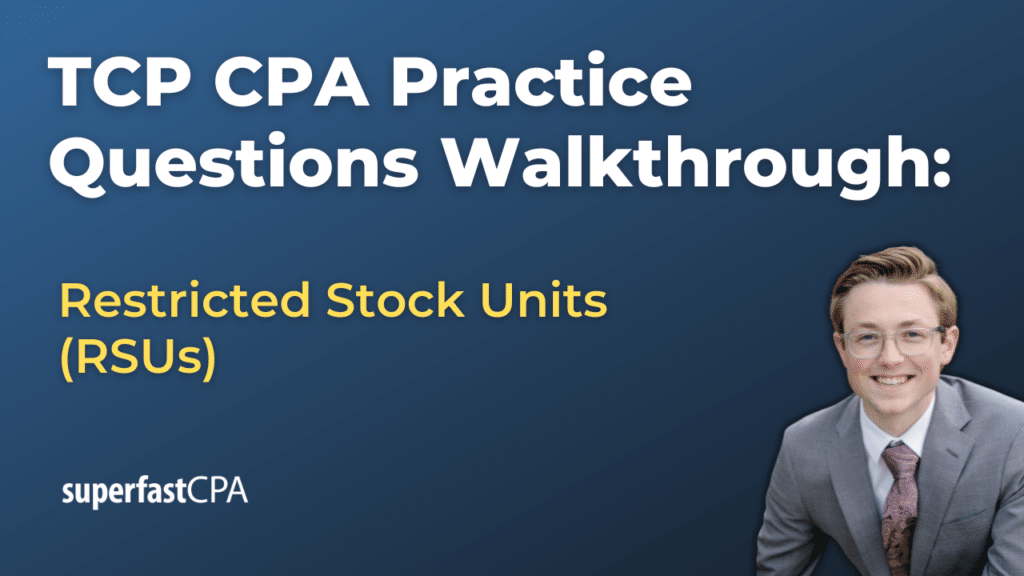In this video, we walk through 5 TCP practice questions teaching about Restricted Stock Units (RSUs). These questions are from TCP content area 1 on the AICPA CPA exam blueprints: Tax Compliance and Planning for Individuals and Personal Financial Planning.
The best way to use this video is to pause each time we get to a new question in the video, and then make your own attempt at the question before watching us go through it.
Also be sure to watch one of our free webinars on the 6 “key ingredients” to an extremely effective & efficient CPA study process here…
Restricted Stock Units (RSUs) as Equity Compensation
Restricted Stock Units (RSUs) are a form of equity compensation offered by employers to incentivize and retain employees. Unlike traditional stock options, RSUs are granted in the form of units that don’t represent ownership of the stock at the time of issuance. Instead, they provide the promise that the employee will receive shares of the company’s stock or a cash equivalent in the future upon meeting certain conditions.
Key Features of RSUs:
- Grant Date: This is when the employer awards RSUs to an employee based on the terms of an employment agreement.
- Vesting Schedule: RSUs come with a vesting schedule, which is a set period during which the employee must meet certain criteria to earn the right to the stock. Common vesting criteria include continued employment over a number of years and/or meeting performance targets.
- Vesting Date: Upon reaching the vesting date, and assuming the vesting criteria are met, the RSUs convert to actual shares of stock or cash equivalent. Employees do not own the shares or have any shareholder rights (like voting) until the RSUs vest.
- Settlement: Following vesting, the company issues stock or cash to the employee. This process is known as settlement.
Tax Implications:
RSUs are taxed as ordinary income at the time they vest based on the fair market value of the shares. This means that employees will owe taxes on the value of the shares at the rate applicable to their income bracket. Any subsequent gain or loss after the vesting date, resulting from selling the shares at a higher or lower price, is treated as capital gains or losses.
Example:
Imagine an employee, Alice, who starts working at TechCorp on January 1, Year 1. On her start date, she is granted 1,000 RSUs as part of her compensation, with a four-year cliff vesting schedule. This means that Alice’s RSUs will vest entirely after four years of continuous service, specifically on January 1, Year 5.
Assuming the stock’s market price at the time of vesting is $20 per share, the total value of the RSUs at vesting would be $20,000 (1,000 shares * $20 per share). Alice would owe taxes on this $20,000 as ordinary income in Year 5. If Alice sells the shares later when the stock price is $25 per share, her capital gain would be $5,000 ($25,000 – $20,000), which would be subject to capital gains tax.
Advantages of RSUs:
- Retention Tool: By tying the vesting of RSUs to continued employment or performance metrics, companies can effectively retain key employees.
- Reduced Upfront Cost for Employees: Employees receive RSUs without an upfront cost, unlike stock options where employees need to pay an exercise price.
- Potential for High Reward: Employees benefit from the appreciation of the company’s stock with no initial investment.
Disadvantages of RSUs:
- Tax Burden: The taxation at vesting can be a significant burden if the stock value is high, as taxes are due regardless of whether shares are sold.
- Lack of Control: Employees have no control over the timing of the taxation because they are taxed at vesting.
- Market Risk: Since RSUs convert to stock at a future date, employees bear the risk of stock value fluctuations.
RSUs are a powerful tool for companies looking to attract, reward, and retain employees by aligning their interests with the growth of the company. However, the benefits come with certain risks and tax implications that employees must manage.













